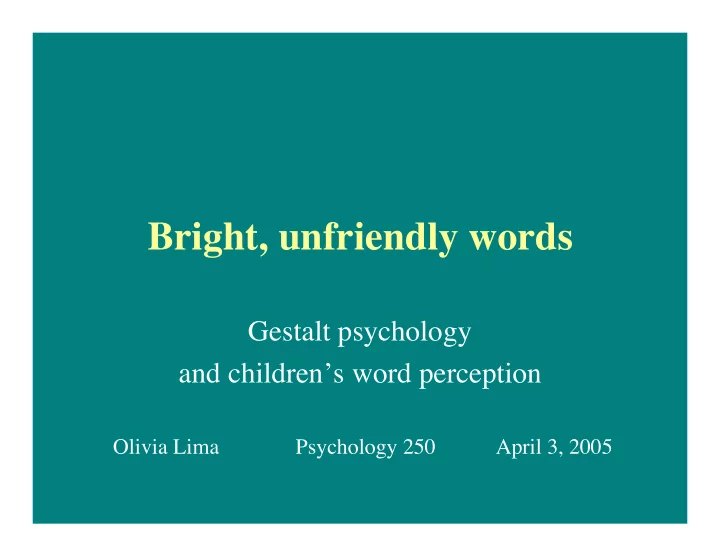

Bright, unfriendly words Gestalt psychology and children’s word perception Olivia Lima Psychology 250 April 3, 2005
Consider these figures…
Which is called “TAKETE”?
And which is “MALUMA”?
What did you say? • Maluma is the round one, and Takete pointy? • Nearly all adults identify this way • What about the figures makes us identify them so predictably? • What about our minds makes us identify them so predictably?
Gestalt Psychology • Kohler (1929) - Tendency to perceive wholes - Organization of perception according to patterns • Lindauer (1990) - Attribution of qualities to maluma & takete Kohler, W. (1929). Gestalt Psychology . New York: Liveright. Lindauer, M. S. (1990). The effects of the physiognomic stimuli taketa and maluma on the meanings of neutral stimuli. Bulletin of the Psychonomic Society. Vol 28(2), 151-154.
Expansions • Cross cultural / linguistic - English 1 - Dutch (another Germanic) 2 - French (Romance) 3 - Serbian (Slavic) 4 1: Irwin, F.W. & Newland, E. (1940). A genetic study of the naming of visual figures. Journal of Psychology, 9 , 3-16. 2 & 3: Ammon, K. H., Moerman, C., Guleac, J. D. (1977) Aphasics' defective perception of connotative meaning of verbal items which have no denotative meaning. Cortex. Vol 13(4), 453-457. 4: Jankovic & Markovic (2000,2001)
Expansions • Production 4 - More m, a, l, o, n phonemes for Maluma - More t, z, r, c, k phonemes for Takete • Other populations - Aphasics: not present 5 - Children: present in grade school 6 . 4: Jankovic &* Markovic, 2000,2001 5: Ammon, Moerman & Guleac, 1977 6: Irwin & Newland, 1940
Our study • What about preschool children? • How early can this phenomenon be observed? • Are there developmental changes during the preschool period? • Requires some procedural modification
The teddy bear is in the MALUMA box. Can you find him?
Preliminary Results • 83% of preschoolers use names like adults • 2, 3, and 4-year-olds tested
Future Directions • Word specific? - Local phonemes, existing words • Phoneme classes - Voiced / unvoiced • Refugee population - African languages
Thanks to collaborators • Lise Dobrin • Lauren Malone • Vikram Jaswal • Keelah Andrews • Michael Kubovy • Sally Gustafson • Jon Backdash • Gillian Hatch • Michael Schutz • Brittany McLaughlin • Molly Wallace • Cristina Wilcox
Recommend
More recommend